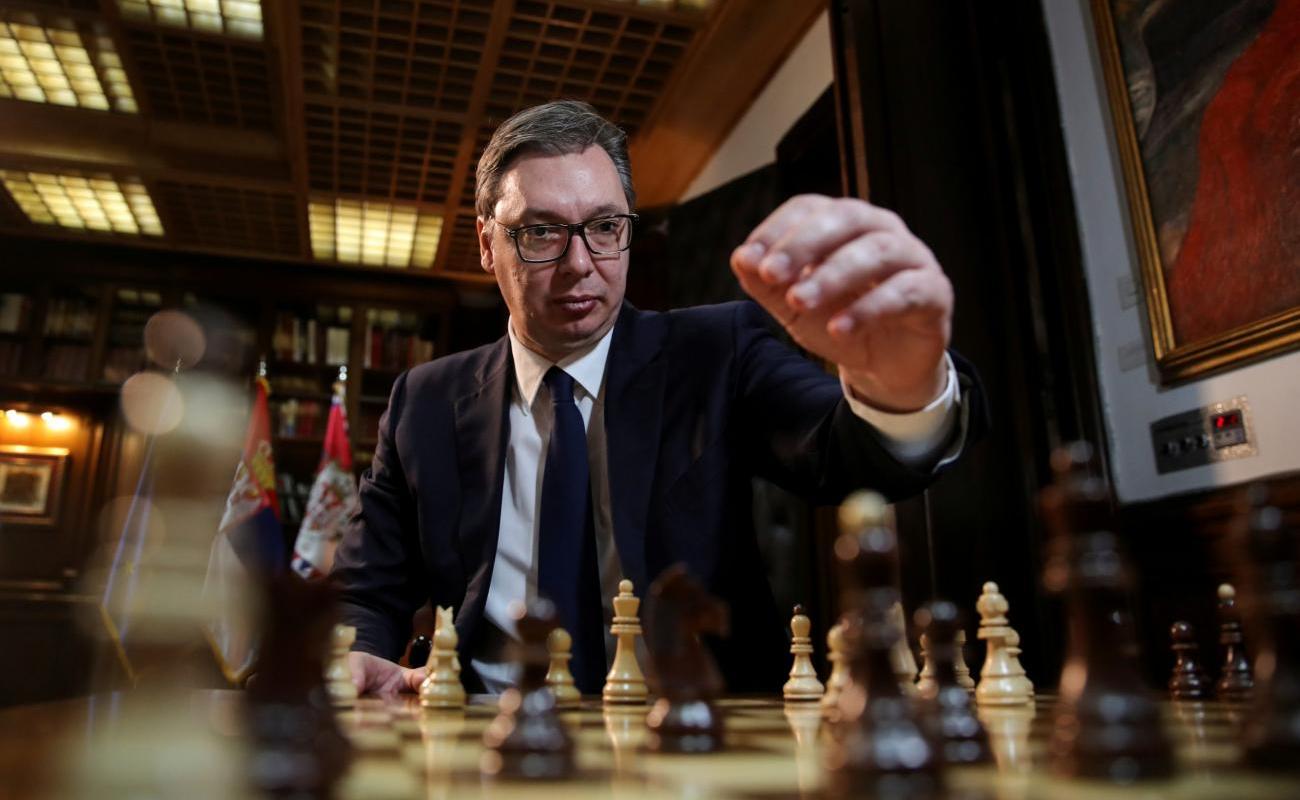Serbian Propaganda Factories Boost Support for Moscow

As Serbian media outlets stoke support for Russia across the Balkans, the West must challenge Belgrade’s disinformation.
When Ukraine’s first lady, Olena Zelenska, arrived in Belgrade on May 12, one media outlet described it as “a signal of the Balkan country’s swing away from Moscow.” Another drew a similar conclusion. But most Serbs across the Balkans don’t see it that way.
Serbia’s increasingly authoritarian President Aleksandar Vučić has sought to sell an image of neutrality over Ukraine, saying his country is not “any side’s flunkey” as he attempts to position himself as a Tito-like figure, capable of maintaining amicable relations with both the West and Russia.
To appease his Western friends, he’s reported to have sent some “lethal weapons” and humanitarian aid to Ukraine — apparently enough to ensure there was little reaction to his regime’s 2023 destabilizing actions in Kosovo, which led to the injury of more than 90 NATO peacekeepers, and a terrorist attack in Banjska.
Whatever Vučić is telling the West, two years into the full-scale war, Serbs throughout the Balkan region are openly supportive of Russia’s actions.
A poll across the Western Balkans by the International Republic Institute (IRI) released on May 14 showed that, while a majority of respondents from Albania, Kosovo, Bosnia and Herzegovina, Montenegro, and North Macedonia denounced Russia’s aggression in Ukraine, 49% of Serbians viewed it as “justified.”
Significant numbers in Montenegro (31%) and Bosnia and Herzegovina (27%) also backed Russia’s actions, closely tracking the number of Serbs in each country. Some 29% of Montenegrins described their ethnicity as Serb in the 2011 census, while Bosnia and Herzegovina is 31% Serb, according to a 2013 estimate.
Their views echo those of Serbian news outlets with close ties to the Vučić regime, which frequently disseminate pro-Kremlin propaganda to countries with significant Serb populations.
Anti-Western narratives find fertile ground among Serbs, many of whom believe NATO’s military interventions in Bosnia and Herzegovina in 1995 and in Kosovo in 1999 were unjustified.
Sometimes, when defending the Kremlin, Vučić likens Russia’s full-scale invasion of Ukraine to NATO’s bombing of Serbian targets during the Kosovo war, despite the differences.
Explicit support for either side of the Russia-Ukraine war also mirrors the Western Balkan region. Albanians and Kosovars overwhelmingly back Ukraine, while explicit support for Kyiv is more subdued in Bosnia and Herzegovina, Montenegro, and North Macedonia. It is minimal in Serbia (4%.)
A significant portion of Serbians (54%) explicitly align with Russia, reflecting the enduring ties between Belgrade and Moscow. Additionally, Moscow has the support of a substantial minority of Montenegrins (26%), Bosnians (26%), and Macedonians (19%.)
Russia does not have the economic heft of the European Union (EU) and China in the Western Balkans, but Gazprom and Lukoil continue to exert substantial control over the energy sectors in Serbia, Bosnia and Herzegovina and North Macedonia. Russian elites also own about a third of yachts registered in Montenegro, with its Adriatic coast, and nearly 40% of its real estate.
The most obvious reason the Kremlin finds favor among Serbs is that Balkan elites like Vučić (Serbia), Milorad Dodik (the Bosnian Serb leader), and Andrija Mandić (speaker of Montenegro’s parliament) maintain close ties with the Kremlin, backed by local and Russian media and the Serbian Orthodox Church. These connections serve as conduits for Russian narratives, shaping public opinion and policy stances in the region.
While Western states have barred Moscow’s propaganda outlets, Serbia has welcomed Russia, not only allowing it to continue its information warfare from the Sputnik Serbia office in Belgrade but also through the opening of RT Balkan, which has expanded Russian disinformation operations.
Both outlets provide news in Serbian, which allows the Kremlin to reach a wide audience throughout the Balkans. Sputnik Serbia also works closely with local media outlets by supplying them with Kremlin-manufactured propaganda.
While Serbia has provided some assistance to Ukraine, the regime has refused to impose sanctions on Russia because, in the words of Vučić, “A friend in need is a friend indeed.” He has been selling dual-use military technology to Moscow and opened Serbia’s doors to a substantial number of Russian businesses, creating opportunities to dodge Western sanctions.
If the West wants to counter Russian disinformation in the Balkans, it must confront its epicenter: Belgrade, which houses many of the Serb media organizations parroting Kremlin propaganda.
Tackling pro-Kremlin media is also important because Russia is fueling secessionist sentiments among Serbs in Republika Srpska and in Northern Kosovo, posing a threat to regional stability. A February report from the US Office of the Director of National Intelligence highlighted the potential for conflict escalation in the region.
Such an escalation would not only affect the Balkans but would have serious consequences for Ukraine given that the West has limited capacity to respond to further crises and wars.
By Leon Hartwell, for CEPA
Dr. Leon Hartwell is a Non-Resident Senior Fellow at CEPA and a Senior Associate at LSE IDEAS, London School of Economics.
Europe’s Edge is CEPA’s online journal covering critical topics on the foreign policy docket across Europe and North America. All opinions are those of the author and do not necessarily represent the position or views of the institutions they represent or the Center for European Policy Analysis.
